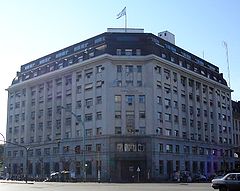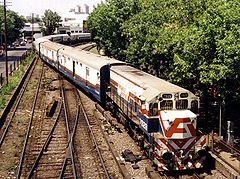
Ferrocarriles Argentinos
Encyclopedia



Government-owned corporation
A government-owned corporation, state-owned company, state-owned entity, state enterprise, publicly owned corporation, government business enterprise, or parastatal is a legal entity created by a government to undertake commercial activities on behalf of an owner government...
that managed the entire Argentine
Argentina
Argentina , officially the Argentine Republic , is the second largest country in South America by land area, after Brazil. It is constituted as a federation of 23 provinces and an autonomous city, Buenos Aires...
railway
Rail transport
Rail transport is a means of conveyance of passengers and goods by way of wheeled vehicles running on rail tracks. In contrast to road transport, where vehicles merely run on a prepared surface, rail vehicles are also directionally guided by the tracks they run on...
system for nearly 45 years. It was formed in 1948 when all the private railway companies were nationalised
Railway Nationalisation in Argentina
In 1948, during President Juan Perón’s first term of office, the seven British-owned and three French-owned railway companies then operating in Argentina, were purchased by the state...
during Perón
Juan Perón
Juan Domingo Perón was an Argentine military officer, and politician. Perón was three times elected as President of Argentina though he only managed to serve one full term, after serving in several government positions, including the Secretary of Labor and the Vice Presidency...
's first presidential
President of Argentina
The President of the Argentine Nation , usually known as the President of Argentina, is the head of state of Argentina. Under the national Constitution, the President is also the chief executive of the federal government and Commander-in-Chief of the armed forces.Through Argentine history, the...
term, and transformed into the Empresa de Ferrocarriles del Estado Argentino (EFEA) (in English: Argentine State Railways Company).
Divisions
The FA comprised the following 6 divisions:- Ferrocarril Domingo Faustino SarmientoFerrocarril Domingo Faustino SarmientoThe Ferrocarril Domingo Faustino Sarmiento , named after the former Argentine president, statesman, educator, and author Domingo Faustino Sarmiento, was one of the six state-owned Argentine railway companies formed after President Juan Perón's nationalisation of the Argentine railway network in 1948...
- Ferrocarril General Bartolomé MitreFerrocarril General Bartolomé MitreFerrocarril General Bartolomé Mitre , named after the former Argentine president Bartolomé Mitre, was one of the six state-owned Argentine railway companies formed after President Juan Perón's nationalisation of the railway network in 1948...
- Ferrocarril General Manuel BelgranoFerrocarril General Manuel BelgranoFerrocarril General Manuel Belgrano , named after the Argentine politician and military leader Manuel Belgrano, was one of the six state-owned Argentine railway companies formed after President Juan Perón's nationalisation of the railway network in 1948...
- Ferrocarril General RocaFerrocarril General RocaFerrocarril General Roca , named after the former Argentine president Julio Argentino Roca, was one of the six state-owned Argentine railway companies formed after President Juan Perón's nationalisation of the railway network in 1948...
- Ferrocarril General San MartínFerrocarril General San MartínFerrocarril General San Martín , named after the former Argentine general José de San Martín, was one of the six state-owned Argentine railway companies formed after President Juan Perón's nationalisation of the railway network in 1948...
- Ferrocarril General UrquizaFerrocarril General UrquizaFerrocarril General Urquiza , named after the Argentine general and politician Justo José de Urquiza, was one of the six state-owned Argentine railway companies formed after President Juan Perón's nationalisation of the railway network in 1948...
Growth and decline
During the FA era, the Argentine railway system featured its maximum extension, being the biggest in Latin AmericaLatin America
Latin America is a region of the Americas where Romance languages – particularly Spanish and Portuguese, and variably French – are primarily spoken. Latin America has an area of approximately 21,069,500 km² , almost 3.9% of the Earth's surface or 14.1% of its land surface area...
, with over 45000 kilometres (27,961.8 mi) of railways. However, under the military junta
Military junta
A junta or military junta is a government led by a committee of military leaders. The term derives from the Spanish language junta meaning committee, specifically a board of directors...
of the Proceso (1976–1983) and the following democratic Alfonsín
Raúl Alfonsín
Raúl Ricardo Alfonsín was an Argentine lawyer, politician and statesman, who served as the President of Argentina from December 10, 1983, to July 8, 1989. Alfonsín was the first democratically-elected president of Argentina following the military government known as the National Reorganization...
administration, FA entered a recessive period that ended with its total privatisation
Railway Privatisation in Argentina
Following a prolonged period of hyperinflation in the 1980s, accompanied by a steep increase in fiscal deficit and a sharp fall in reserves, the Argentine government, under the presidency of Carlos Menem from 1989, initiated a series of neoliberal reforms which included the privatisation of...
beginning in 1992, as part of Menem
Carlos Menem
Carlos Saúl Menem is an Argentine politician who was President of Argentina from 1989 to 1999. He is currently an Argentine National Senator for La Rioja Province.-Early life:...
's neoliberal
Neoliberalism
Neoliberalism is a market-driven approach to economic and social policy based on neoclassical theories of economics that emphasizes the efficiency of private enterprise, liberalized trade and relatively open markets, and therefore seeks to maximize the role of the private sector in determining the...
reforms.
Break-up and privatisation
In 1991 it was divided, with the Buenos AiresBuenos Aires
Buenos Aires is the capital and largest city of Argentina, and the second-largest metropolitan area in South America, after São Paulo. It is located on the western shore of the estuary of the Río de la Plata, on the southeastern coast of the South American continent...
metropolitan services being grouped in Ferrocarriles Metropolitanos S. A.
FEMESA
Ferrocarriles Metropolitanos S.A. was a company set up by the Argentine government in 1991, during the presidency of Carlos Menem, to oversee the privatisation of commuter rail services within the city of Buenos Aires in Argentina. The company granted concessions to Metropolitano S.A., Ferrovias...
(FEMESA). The major freight
Cargo
Cargo is goods or produce transported, generally for commercial gain, by ship, aircraft, train, van or truck. In modern times, containers are used in most intermodal long-haul cargo transport.-Marine:...
line, the Ferrocarril General Manuel Belgrano
Ferrocarril General Manuel Belgrano
Ferrocarril General Manuel Belgrano , named after the Argentine politician and military leader Manuel Belgrano, was one of the six state-owned Argentine railway companies formed after President Juan Perón's nationalisation of the railway network in 1948...
, was kept by the state until it was given to the railway workers' trade union
Trade union
A trade union, trades union or labor union is an organization of workers that have banded together to achieve common goals such as better working conditions. The trade union, through its leadership, bargains with the employer on behalf of union members and negotiates labour contracts with...
, the Unión Ferroviaria and renamed the Belgrano Cargas
Belgrano Cargas
Belgrano Cargas S.A. is a company which operates a gauge freight rail network in Argentina, built by the state-owned Ferrocarril Central Norte and the French-owned Ferrocarril Provincial de Santa Fe, which became part of Ferrocarril General Manuel Belgrano after railway nationisation in 1948...
. The second biggest line, the Mitre Cargas, was granted by concession in December 1992 to Nuevo Central Argentino S. A.
Nuevo Central Argentino
Nuevo Central Argentino S. A. is an Argentine company that exploits the operation and infrastructure of the national railway system of the former Ferrocarril General Bartolomé Mitre division of Ferrocarriles Argentinos, by a concession granted on 23 December 1992 as part of railway privatisation...
(NCA). The Railroad Development Corporation is another concessionary, under the name of América Latina Logística (ALL).

